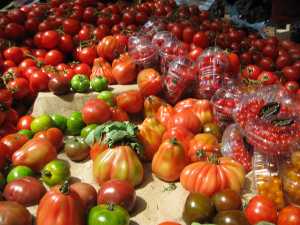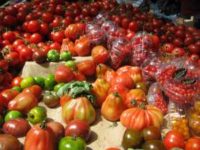
16 Jul Not All Tomatoes Are Equally Allergenic
MedicalResearch.com Interview with:
 Prof. Dr. rer. nat. Wilfried Schwab
Prof. Dr. rer. nat. Wilfried Schwab
Technical University of Munich
Center of Life and Food Science Weihenstephan
Biotechnology of Natural Products
Freising, Germany
MedicalResearch.com: What is the background for this study?
Response: The prevalence of food allergy is an increasing health problem. Although tomatoes are one of the most consumed vegetables worldwide and have health beneficial effects lowering the risk of cancer and cardiovascular diseases, patients suffering from birch pollen allergy can develop cross-reactivity after consumption of fresh tomatoes.
The aim of this study was to develop an analytical method for the quantification of the birch-pollen homologous allergen Sola l 4 in various tomatoes cultivars. Furthermore, the effect of conventional or organic cultivation as well as processing techniques on Sola l 4 content was investigated.
MedicalResearch.com: What are the main findings?
Response: The main findings were that tomato cultivars differ significantly in their allergen amount. Moreover, the allergen content decreased after drying of tomato fruits due to heat treatment. Growing conditions have a minor effect whereas seasonal effects including rainfall, humidity, temperature and pathogen infestation show a more pronounced impact. Thus, the allergen content is mainly determined by the genotype.
MedicalResearch.com: What should readers take away from your report?
Response: The findings about the allergen level of different tomato varieties may help to improve the food safety to potentially increase the life quality for patients suffering from birch pollen-related food allergy. For breeders, Sola l 4 can be used a marker for breeding hypoallergenic tomato varieties.
MedicalResearch.com: What recommendations do you have for future research as a result of this work?
Response: To obtain a clearer understanding about the allergen content in tomatoes and the effects to allergic patients, additional studies including human trials with patients allergic to tomatoes are required. The results of this study have to be confirmed by further immune tests. It has to be taken into account, that the severity of an allergic reaction to tomato fruit is related to the individual sensitivity and the different antibody-binding profile of affected patient suffering from tomato allergies.
Citation:
Elisabeth Kurze, Roberto Lo Scalzo, Gabriele Campanelli, Wilfried Schwab. Effect of tomato variety, cultivation, climate and processing on Sola l 4, an allergen from Solanum lycopersicum. PLOS ONE, 2018; 13 (6): e0197971 DOI: 10.1371/journal.pone.0197971
[wysija_form id=”3″]
[last-modified]
The information on MedicalResearch.com is provided for educational purposes only, and is in no way intended to diagnose, cure, or treat any medical or other condition. Always seek the advice of your physician or other qualified health and ask your doctor any questions you may have regarding a medical condition. In addition to all other limitations and disclaimers in this agreement, service provider and its third party providers disclaim any liability or loss in connection with the content provided on this website.
Last Updated on July 16, 2018 by Marie Benz MD FAAD
